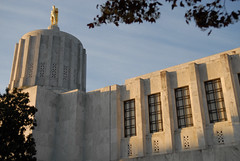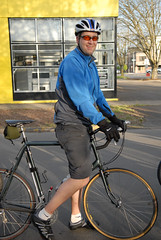A bill that would officially make it “in the state’s interest” to move forward on the I-5 freeway widening project between Oregon and Washington will be given a public hearing in Salem today. The bill, HB 2800, is being pushed by Governor Kitzhaber and many high-profile Democrats and other backers of the Columbia River Crossing project.
A House Joint Committee will hear invited testimony from the Governor as well as Oregon Transportation Commission chair Pat Egan and ODOT’s Deputy Project Director Kris Strickler. If anti-CRC activists are successful, the committee will also hear from dozens of people speaking out against the bill (and the project in general). According to a Facebook page where activists are organizing carpools to attend the 3:00 pm hearing, there are about 40 people so far who plan to make the trip.
“This is a classic Robert Moses strategy to promise anything to get the project started and then re-work the deal however needed later on.”
— Joe Cortright, economist and CRC critic
HB 2800 looks to be a kinder, gentler version of HB 2260, which was considered “egregiously” pro-CRC and dubbed “the CRC Blank Check Act” by critics when it dropped a few weeks ago. Sources who oppose the project say HB 2800 isn’t nearly as bad, but they remain extremely skeptical.
Economist and outspoken critic of the project, Joe Cortright says while CRC backers are making it seem like HB 2800 put limits on project spending and answers other fiscal concerns with the project, the devil is in the details (and the details are pretty fuzzy). “This is a classic Robert Moses strategy to promise anything to get the project started,” says Cortright, “and then re-work the deal however needed (ignored conditions, forgiveness, more money) later on… Superficially, this bill isn’t as egregious as HB 2260; But given our experience with CRC and “conditions” [contained in HB 2800] it’s hardly a reason to be reassured.”
For instance, the bill puts a cap of $3.4 billion on the total project cost. But are we really to expect that if the project needed more funding that officials would simply walk away from it and leave it unfinished? And that cap of $3.4 billion does not include the $160 million already spent planning the project. Another provision would allow tolls to disappear after construction bonds are repaid. Cortright says that would, “seriously undercut the environmental claims and promises CRC has offered for years,” because CRC staff have said tolling would be a key way to manage traffic demand into the future.
And then there’s the section of the bill that refers to a mitigation fund intended to offset, “any air quality or other public health concerns that may impact the communities along the Interstate 5 corridor.” Instead of demanding that the project create such a fund, the bill includes the soft-ball language of, “shall conduct a study and develop recommendations.” That’s hardly a strong promise.
State Representative and Chair of the House Transportation Committee Tobias Read (D-Beaverton), who has shown up to many Bicycle Transportation Alliance events and joined us for a bike ride at the Oregon Bike Summit a few years ago, told The Oregonian this morning: “I can say for myself that I am convinced it’s time to take a prudent step forward to authorize funding the Oregon portion, and send a signal to our partners in Washington that were ready to go.”
Activists hope to weaken that signal.
There’s still time to head down to Salem to tell legislators your thoughts on this project. Carpools are meeting up at 1:00 pm today at 729 E Burnside. More info here.


